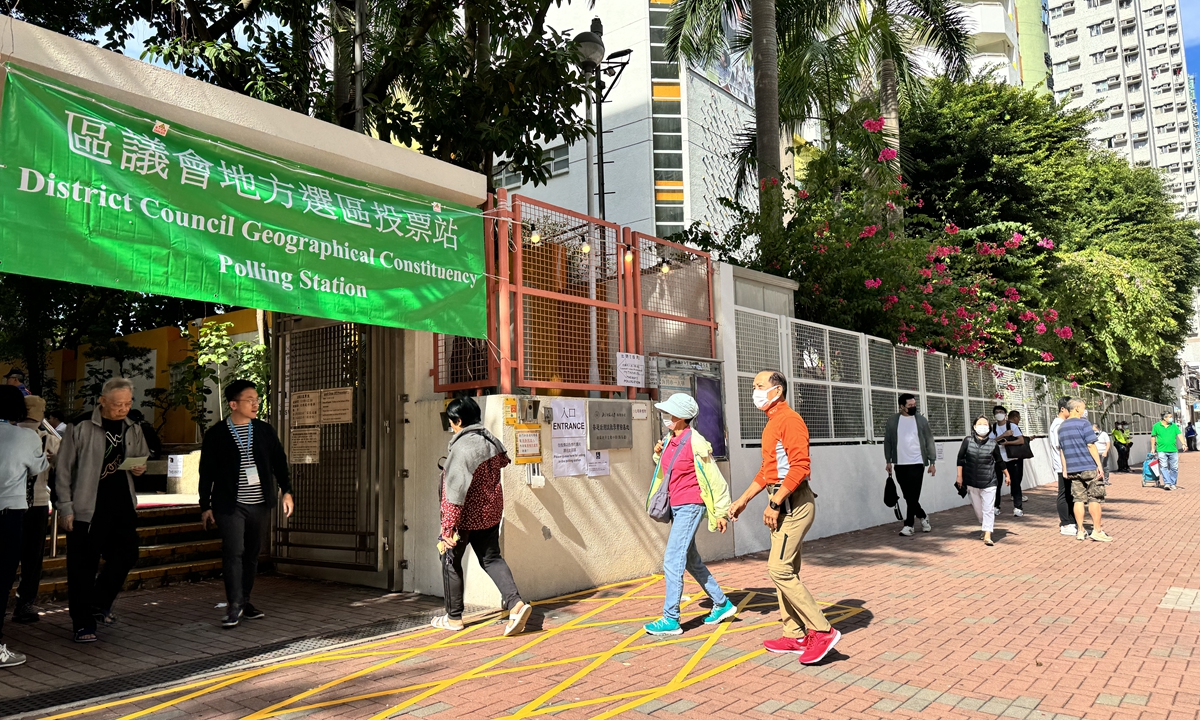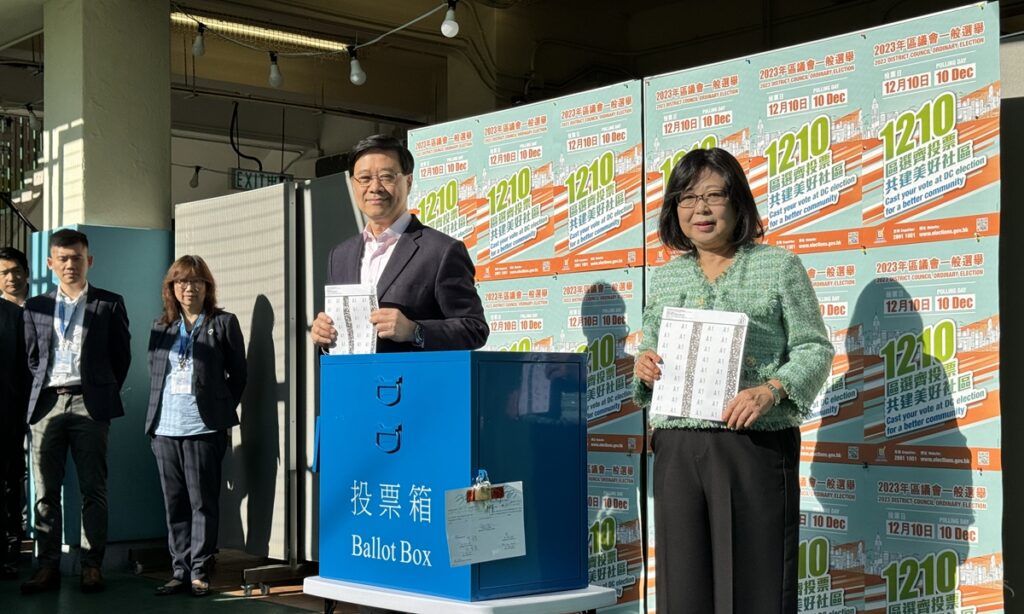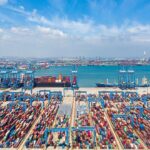The 7th District Council (DC) Election is selecting 176 district councilors from district committees and 88 local district councilors from a pool of 399 candidates. Over 600 polling stations were set up across the city to serve about 4.33 million electors, and a total of 18 District Committees constituency polling stations for constituency voters.
A number of candidates, voters and Hong Kong analysts told the Global Times on the voting day that the election was fiercely competitive and “very colorful.” Because every candidate has to be a patriot, it is believed this election will have a positive impact on Hong Kong’s future and its governance.
Vote for better community
At about 8 am on Sunday, Global Times reporters visited several polling stations located on Robinson Road in Hong Kong Island, Yau Ma Tei in Kowloon and other places, seeing that the staff at the polling stations were already ready and waiting at the entrances to the polling stations.
Large and small signboards and posters for the District Council election were hung up everywhere to guide voters. There were also staff outside the polling station to assist the elderly or other voters in need. Before voting officially started at 8:30 am, voters were already waiting outside the polling station.
At around 9:15 am on Sunday, the Hong Kong Special Administrative Region Chief Executive John Lee and his wife Janet Lee Lam cast their votes at the polling station at 2 Robinson Road, Raimondi College.
This year’s DC election is of great significance because the district council was hijacked in the past and some district council members openly advocated “Hong Kong independence” and did things that endangered national security, Lee said at a press briefing shortly after he cast his vote.
“As we improve district governance, the purpose of the entire plan is to return the district council to its original intention, which is to be a non-political organization with patriots’ participation as our district councilors and will not betray national interests, Hong Kong interests, and regional interests,” Lee said.
Therefore, everyone must take this DC election seriously, make good use of your vote, and elect a district councilor who, first, loves the country and loves Hong Kong; second, is a district councilor who will serve you well, Lee said, calling on the public to cast their votes on Sunday.
Lee also noted that under the new electoral system, the government also has a duty performance monitoring system to ensure that the elected district councilors will be competent, meet the needs of the public and achieve the expected work levels.
The restructured DC will be a DC that implements the principle of “only patriots administering Hong Kong.” It is the last piece of the puzzle for us to implement this principle and ensure that the entire governance system of Hong Kong complies with the requirements of One Country, Two Systems, Lee said.
Michael Ngai, a Hong Kong entrepreneur, arrived at the polling station early in the morning and lined up. After voting, he told the Global Times that he was very happy to see that people from different backgrounds and political parties could become candidates in this election.
“I’m even more happy that all the candidates this time were patriotic, holding the same ideals and having good intentions to serve society,” he said, noting that the candidates’ professional abilities and their experience and achievements in serving society in the past few years are the basis for choosing whom to vote for.
A major difference for the DC election this year compared to that in 2019 is that candidates are running for the public good now rather than using the DC to push a political agenda, a 46-year-old local resident surnamed Chan told the Global Times at the polling station in Yaumatei Catholic Primary School on Sunday morning, adding that “We hope that they will work to solve our problems and difficulties in the community.”
The DC election in 2019 was described as the most chaotic and dangerous election in Hong Kong’s history, as some polling stations were encircled by anti-government forces and rioters attacked ordinary residents who voted for pro-establishment candidates. The offices of almost all patriotic candidates were destroyed and set on fire by rioters, and their families and volunteers were targeted or even attacked.
However, local authorities have not relaxed their vigilance on this year’s voting day. The Global Times reporters noticed there were police patrolled outside multiple polling stations to prevent potential disruptive incidents.
According to local media reports, during the DC election, more than 10,000 police officers were to be dispatched to polling stations, important infrastructure and crowded places across Hong Kong. Each polling station had at least two police officers stationed there. In addition, the anti-terrorism special service team were reportedly conducted “high-profile anti-terrorism patrols” in densely populated areas to prepare for all incidents.
The computer system at polling stations across Hong Kong malfunctioned on Sunday evening, as the electronic voter registration system became temporarily unavailable. Long queues were seen outside the polling stations at some districts due to the malfunction. The Electoral Affairs Commission announced around 10 pm an extension of the voting deadline to the midnight.

Local residents walk into a polling station in Yaumatei Catholic Primary School in Hong Kong on Sunday morning to cast their votes for 7th District Council Election. Photo: Chen Qingqing/GT
Significant election
This DC election is an important part of implementing “only patriots administering Hong Kong” and reshaping Hong Kong’s political order and governance structure, Lau Siu-kai, a consultant from the Chinese Association of Hong Kong and Macao Studies who is also a senior policy advisor, told the Global Times on Sunday.
Patriotic groups and individuals have actively participated, and the competition was fierce. In particular, the active participation of many young people with higher academic qualifications was eye-catching, Lau said.
Before the election, the HKSAR government and patriotic groups actively invested [resources] in publicity and mobilization work, showing “unprecedented unity and cooperation,” Lau said. “I believe this will have a positive significance for Hong Kong’s future good governance and the stability and long-term implementation of One Country, Two Systems, he added.
In response to some foreign media’s descriptions of this election such as “just a show” or “marginalizing opposition figures,” Lau said that a “colorful election” refers to the “colorful colors within the patriotic camp,” and does not necessarily have to include candidates who do not accept Hong Kong’s new policies.
Only those who belong to the political order can be considered “colorful” by running for election. From this perspective, the candidates for this election come from different professions, backgrounds and groups, and are indeed quite diverse, he said.
Over the past few days, the Global Times found that during this DC election, there was indeed fierce competition among different candidates, but at the same time the atmosphere was harmonious, completely different from the 2019 DC election, which was rife with mutual abuse, criticism and serious social confrontation. The main competition now is about “political platform” and their ability to serve the community.
Taking the most competitive Wan Chai constituency as an example, it is surprising that several “competing” candidates met together to canvass for votes on the streets.
“This DC election is much more intense than the previous term, or even every term,” Jeff Wong Sau-tung, a candidate from the district, told the Global Times.
All candidates are working hard to improve residents’ lives, he said. For example, he is committed to work to solve the rat problem in Wan Chai and add more bus lines to the area.
Another candidate, Nicholas Muk Ka-chun, told the Global Times that in 2019, some candidates did not appear in the community at all on weekdays, but most of the candidates this time have rich service experience in order to win public support. For example, he began to actively participate in the community’s anti-epidemic work and distributed supplies to local people in 2020.
The turnout is the focus of attention from all walks of life. In order to encourage more people to vote, in recent days, many officials of the HKSAR government and many celebrities from Hong Kong’s political and business circles have come to the streets, restaurants and buildings to distribute leaflets and cheer for the candidates.
The composition, voter base and voting system of this DC election are different from those of the 2019 District Council election. Therefore, it is not appropriate to directly compare the cumulative turnout rates of the two elections, David Lok, chairman of the Electoral Affairs Commission, told reporters at the polling station in Yaumatei.
He also said he was confident the election would be conducted in an open, honest, and fair manner, and that the polling and counting of votes would be smooth and completed within a reasonable time.
The turnout in the first four hours was considered to be good. If the overall turnout rate is similar to the voting in the 2021 Legislative Council (LegCo) election, it would be a relatively satisfactory result, former LegCo president Jasper Tsang told reporters on Sunday.
The social atmosphere in this DC election is completely different from that in 2019. At that time, there was “smoke of wars everywhere” and some people said they were afraid to come out to vote. Now the social atmosphere is peaceful, which is conducive for voters to be willing to come out to vote, Tsang added.
“The level of voting turnout is not an important indicator to measure the effectiveness of the new election. What is more important is to see the impact of the DC reform on Hong Kong’s political stability, governance efficiency, regional governance level and other aspects,” Lau said.
At this stage, opposition forces and their supporters still account for a large number of Hong Kong voters. Opposition forces are not eligible to run because they do not meet the standards of “patriots administering Hong Kong,” and the above-mentioned people are resistant to Hong Kong’s new political structure. It is not surprising that they adopt a passive boycott of this election, he said.
However, the expert believes that judging from local elections in other countries around the world and Hong Kong’s past DC elections under normal circumstances, it is a good result if the turnout rate is no lower than 25 percent.
“As patriotic forces continue to grow and Hong Kong’s governance gradually achieves results, I believe that the turnout in DC elections will increase in the future,” he said.




